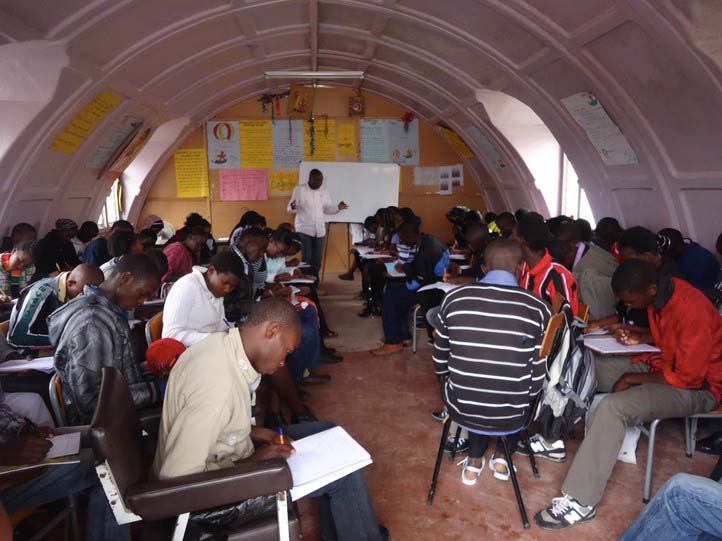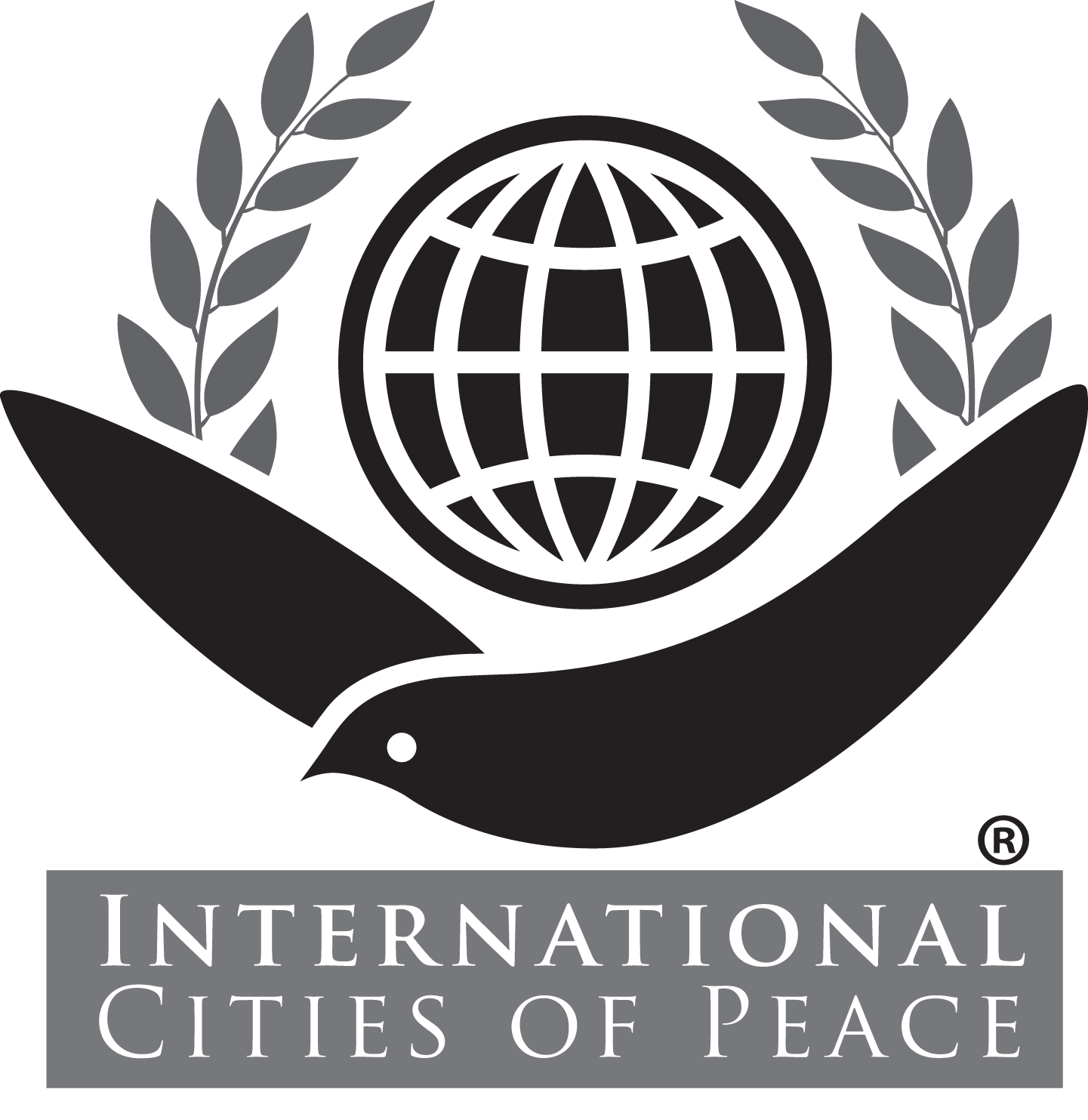| Welcome to Michael Ochieng Nyawino, Project Director of the organization Neema, as well as his colleagues and the citizens of Nairobi, Kenya: City of Peace. The Neema Community Based Organization (CBO) was officially registered on 8th February 2011. The group began operations in January 2014 to offer educational and empowerment services to the community, especially the youth and young mothers aged 18-30 years. Activities include environmental cleanups, guidance and counseling and mentorship programs, and many other peace building projects.
Note: Introduction page with information primarily at the time of joining International Cities of Peace. For updates, please contact the liaison.
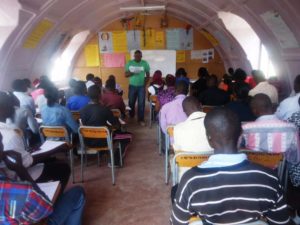
VISION
To be the leading organization in terms of community and youth empowerment.
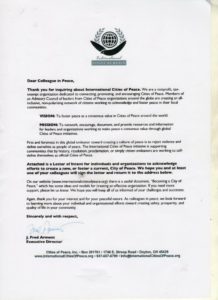
Letter of Intent
MISSION
To efficiently empower the youth to become independent and productive members of the society.
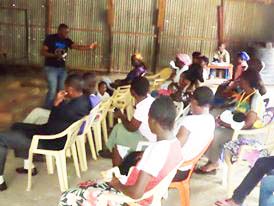
MOTTO
Together We Transform Lives.
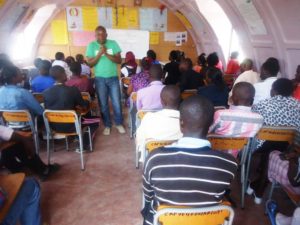
OBJECTIVES
1. To promote entrepreneurship, mentorship and financial literacy education by empowering the youth.
2. Link up with local and international NGOs to help provide services such as education, health, food for aid etc to the community.
3. Provide basic employability skills for the youth to become independent members of the society.
4. To maintain clean environment by taking part in cleaning exercises and offer environ-mental education.
5. To offer guidance and counseling services to the community members.
6. To foster peaceful co-existence among members of the community.
7. Identify youths and women in dire need of assistance and link them up with those who are ready and willing to help.
8. To provide guidance and counseling services to those infected and affected by HIV/AIDS.
9. To educate children about their basic rights.
10. To provide avenues for the youth to showcase talents for personal development.
How do we intend to promote peace?
Poverty or uneven allocation of resources is the major cause of insecurity in developing countries and Kenya is not an exception! The unemployed youths need to be equipped with lifelong Basic Employability Skills Training so that they can be employed in industries or even be supported to start their own small workshops or businesses as a way of earning a living. This will keep the youths out of crime given that they will not have time to be idle. Such trainings are to be majorly in the field of:
1. Carpentry
2. Industrial Garment Manufacturing
3. Electrical Installations
4. Hospitality
5. Welding
6. Building and construction
7. Plumbing
8. Entrepreneurship
9. Information Technology
10. Talent Identification and Development
11. Life Skills etc
12. Other ways of promoting peace include organizing peace tournaments, dancing competitions, seminars and conferences and peace runs.
What do we have?
1. A professional team that have done Basic Employability Skills Training before and is fully equipped and trained on how to conduct such trainings.
2. A community with many unemployed and vulnerable youths.
3. A society willing and ready to be equipped with BEST skills.
4. A written proposal for funding of BEST skills.
What do we require?
1. Linkages and networks with relevant person(s), organization(s) or foundations of the same ideas.
2. Funding so as to jump start the whole exercise of BEST training, acquire training rooms, acquire machines and equipment etc.
What will be the impact?
1. Based on the duration of the funding received, more than 1000 youths will be trained directly on BEST skills.
2. Lives of more than 1000 families will be changed positively.
3. Insecurity will drastically reduce in the community since the project will largely target slums.
4. More than 50 small scale businesses will be started by the youths thereby earning income.
5. The saving culture will have been developed in the trained youths.
6. More than 1000 bank accounts will have been opened by the trained youths.
7. More than 1,000 youths will have been trained on Financial Literacy.
Last but not least, the whole community will have been empowered and so development will improve.
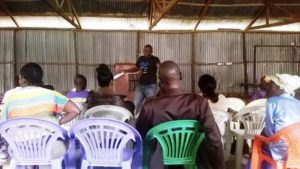
ABOUT MICHAEL OCHIENG NYAWINO
Michael Ochieng Nyawino–Project Director; Neema Community Based Organization
Michael played a bigger role in the formation of the CBO in 2010 at the time when he was still a high school teacher. He took the leadership of the group in December 2014 and he has been steering the group since then. He holds a Bachelor’s degree in Education-Economics and History, Masinde Muliro University of Science and Technology and he is also in his final semester of his masters in Development Studies at Mount Kenya University, Nairobi campus doing his research work. He started working in Mathare in October 2007 as a high school teacher at Kao La Tumaini and later Neema Senior School which are located in Korogocho and Mathare slums respectively.

It was during this time while working in the two slums that Michael developed interest in helping the needy. Having just completed University and graduated as high school teacher of Economics and History, he joined the two schools being paid peanuts but in essence he was developing his skills and also getting to learn how residents in the slums live. His pay was US$ 90 a month from October 2007 to December 2012 when he was earning US$ 150 a month before taxation while high school teachers at this time were earning approximately US$ 490 a month.
He later joined CAP Youth Empowerment Institute (CAPYEI) as Entrepreneurship Development and IT Facilitator where he mentored and trained more than 800 youths directly through Basic Employability Skills Training (BEST). It was during this time that he came face to face with youths who had no means or ways of survival and were seriously vulnerable. Kenya has the highest percentage of youths who are unemployed, a ticking time bomb! Such youths are a threat to security if do not have a source of livelihood! It is this problem which prompted me to undertake masters in development studies so as to be equipped with skills and knowledge on how to help reduce poverty in the society and in the world at large.
CONTACT INFO
For more information please contact:
Contacting Michael Ochieng Nyawino
Michael Ochieng Nyawino
Project Director
Neema Community Based Organization
C/o Malaki Ogada
P.O. Box 294-00618
Ruaraka
Nairobi-Kenya.
Tel: +254725368831
E-mail: michaelnyawino@yahoo.com/michaelnyawino@gmail.com
ABOUT NAIROBI, KENYA (from Wikipedia)
Nairobi /naɪˈroʊbi/ is the capital and largest city of Kenya. The city and its surrounding area also form Nairobi County. The name “Nairobi” comes from the Maasai phrase Enkare Nairobi, which translates to “cool water”. The phrase is also the Maasai name of the Nairobi river, which in turn lent its name to the city. However, it is popularly known as the “Green City in the Sun” and is surrounded by several expanding villa suburbs. Inhabitants of Nairobi are called Nairobians, and the city is governed by the County Government of Nairobi, whose current governor is Evans Kidero.
Nairobi was founded in 1899 as a rail depot on the Uganda Railway. The town quickly grew to replace Machakos as the capital of British East Africa in 1907. After independence in 1963, Nairobi became the capital of the Republic of Kenya. During Kenya’s colonial period, the city became a centre for the colony’s coffee, tea and sisal industry. Nairobi is also a county in itself. The city lies on the Nairobi River in the southern part of country, and has an elevation of 1,795 metres (5,889 ft) above sea level.
With a population of about 3.36 million estimated in 2011, Nairobi is the second-largest city by population in the African Great Lakes region after Dar es Salaam, Tanzania. According to the 2009 census, in the administrative area of Nairobi, 3,138,295 inhabitants lived within 696 km2 (269 sq mi). Nairobi is the 14th-largest city in Africa, including the population of its suburbs.
Kenyans have been enjoying peaceful co-existence right from independence even though there have been pockets of insecurity due to tribal clashes, cattle rustling, theft and land related problems. In 2007/2008, insecurity rose to full blast in the whole country during the presidential elections which made neighbours who have been living and staying together turn against each other resulting into the death of more than 1500 people. Most of these were in slums and in major towns in Kenya such as Nairobi, Kisumu, Naivasha, Eldoret, Nakuru, Mombasa, Kakamega to the cosmopolitan nature of such towns. In Nairobi, such deaths occurred majorly in Mathare, Korogocho and Kibera slums.
Mathare slum is the second largest in size and number of inhabitants in Nairobi-Kenya. Mathare slum has a population of
approximately 500,000 people. Mathare neighbours estates such as Huruma, Kariobangi, Korogocho, Muthaiga, Eastleigh and Mlango Kubwa. In 2006, Mathare was damaged by violence between rival gangs; the Taliban (not to be confused with the Islamist group of the same name), a Luo group and the Mungiki, a Kikuyu group. Brewers of an illegal alcoholic drink, chang’aa asked the Taliban for help after the Mungiki tried to raise taxes on the drink; since then, fighting between the two has led to the burning of hundreds of homes and at least 10 deaths. Police entered the slum on November 7, 2006 and the General Service Unit (GSU-paramilitary) arrived a day later, but many residents who fled are still afraid to return.
On June 5, 2007, the Mungiki murdered two police officers in Mathare, the same night, the police retaliated by killing 22 people and detaining around 100. Following the controversial presidential elections that took place on 27th December 2007, gangs of Kikuyu and Luo youth engaged in violent fights and burned more than 100 homes. More than 80 percent of the residents of Mathare slum are unemployed and so they rely entirely on menial jobs and duties to earn a living. This force majority of the youths to take part in theft so as to make ends meet. This put them in a collision path with the security officials who gun them down. The youth who run small businesses (kiosks) do not have entrepreneurship skills yet a market already exists where they are.
Most of the unwanted pregnancies do occur in the slum because of inability of parents from the area and its surroundings to afford school or college fees for their children. Girls and young women from the area resort to prostitution as a method of earning a living resulting into a high number of unplanned births. Residents of Mathare slum have never had an opportunity to be trained on Entrepreneurship, Mentorship and Financial Literacy Skills. This will help the resident to plan, budget and spend their money wisely and live within their means, save money and invest to improve their economic and living conditions. Youths have been used by politicians and leaders to cause mayhem in the community by hiring gangs to attack opponents supporters resulting into deaths and even arrests of some who to date are still languishing in prisons.
A number of youths in the country have migrated to Far East countries in search of greener pasture but most of which end up being abused by their employers in the Far East. Most of which have come back because they lack skills or training required for such jobs. Most youths have the willingness and passion of doing business but lack the basic entrepreneurship skills which have made quite a number of their businesses to collapse.
Average earnings per household in Mathare
The average daily household income is less than a dollar pay day with degree of poverty is unimaginable. People live in 6ft. by 8ft. shanties made of old tin and mud. There are no beds, electricity and no running water. People sleep on pieces of cardboard on the dirt floors of the shanties. There are public toilets shared by up to 100 people and residents have to pay to use them. Those who cannot afford to pay must use the alleys and ditches between the shanties. “Flying toilets” are plastic bags used by the residents at night, and then thrown into the Nairobi River, which is the source of the residents’ water supply. Many parents die of AIDS and leave their children to fend for themselves.
Facts about Mathare
• 70% of Nairobi’s population of four million lives on 5% of the city’s land area.
• Mathare Valley contains a population greater than the cities of Seattle, Denver or Boston, yet the slum covers an area of only three square miles. In comparison, Seattle covers 80 square miles, Boston 42 square miles and Denver 150 square miles.
• It is estimated that one of every three adults in Mathare is HIV positive.
• The average life expectancy for a person who is HIV positive in Mathare is five (5) years or less.
• Common health problems for children in Mathare include dysentery, malnutrition, malaria, typhoid, cholera, infections, tetanus and polio.
• Juvenile heads of households are common. This is a situation where a child or teen, some as young as 8 or 9 years old, is left to care for younger siblings, since both parents have died of AIDS.
• There are an estimated 70,000 children in the Mathare Valley with only 3-4 schools to educate them. Many children do not attend school.
• Without an education on the children in the Mathare Valley often turn to a future of crime, prostitution, drug abuse and diseases.
DO YOU THINK YOUR COMMUNITY CAN BE A CITY OF PEACE? SEND AN EMAIL!
Note: If information or photos used here are copyrighted, please contact us and we will immediately delete the copyrighted material.
|
